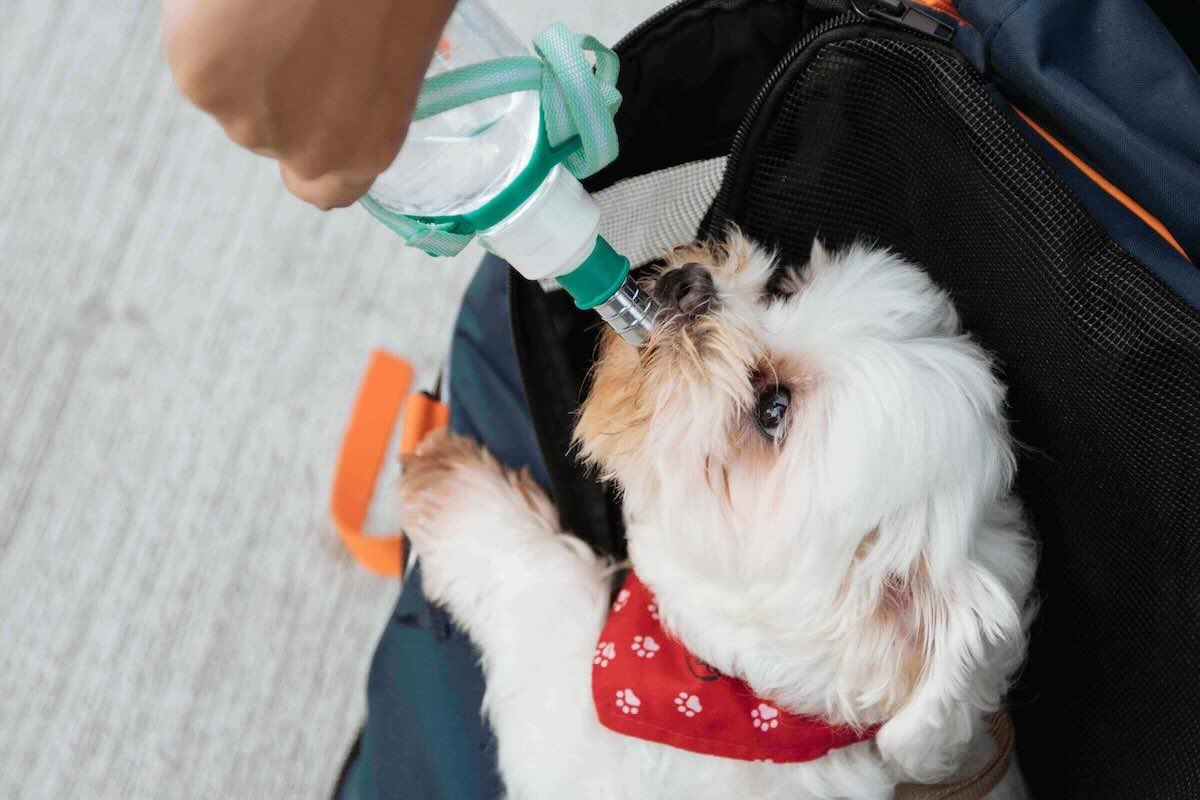As a pet owner, it’s not unusual to be concerned when your dog coughs after drinking water. While occasional coughing might not be a cause for alarm, persistent or severe coughing could indicate an underlying health issue. If you’ve found yourself asking, “Why does my dog cough after drinking water?”, you’re not alone. This behavior can be triggered by several factors, ranging from harmless habits to more serious medical conditions. In this detailed guide, we’ll explore the common causes of coughing in dogs, symptoms to watch out for, when to seek veterinary help, and ways to prevent your dog from coughing after drinking water.
1. Introduction: Understanding the Cough Reflex in Dogs
Coughing is a natural reflex designed to clear the airway, but when it happens frequently or after drinking water, it can raise concerns. In dogs, a cough might be a simple result of drinking too quickly, or it could be a symptom of a deeper health issue. It’s important to differentiate between normal behavior and something that requires veterinary attention.
Normal vs. Abnormal Coughing
Coughing that occurs occasionally or after drinking water is typically harmless. However, if your dog’s coughing becomes persistent or if it’s accompanied by other symptoms like lethargy, wheezing, or difficulty breathing, it’s a good idea to consult with a veterinarian. Now, let’s dive into the most common reasons why your dog might cough after drinking water.
2. Common Causes of Coughing After Drinking Water
2.1 Drinking Too Quickly
One of the most common reasons dogs cough after drinking water is that they drink too quickly. Dogs that gulp water rapidly may inadvertently inhale some of it, causing irritation in the throat and triggering a cough. This type of cough is usually harmless and resolves once the dog has cleared the water from their airway.
Solution: To help your dog drink more slowly, consider using a slow-feed water bowl or provide smaller portions of water throughout the day. Slowing down their drinking habit can prevent coughing episodes and help keep your dog hydrated without causing discomfort.
2.2 Tracheal Collapse
Tracheal collapse is a condition where the cartilage in a dog’s trachea (windpipe) weakens and causes the trachea to flatten. This can make it difficult for air to flow freely, resulting in coughing, especially after drinking or exerting physical activity. Tracheal collapse is most common in small dog breeds such as Chihuahuas, Yorkshire Terriers, and Pomeranians.
Symptoms of Tracheal Collapse:
- A dry, honking cough
- Coughing during excitement or after drinking water
- Difficulty breathing, especially during exercise or excitement
Treatment: In mild cases, weight management and using a harness instead of a collar can alleviate symptoms. In more severe cases, medication or surgery may be required.
2.3 Laryngeal Paralysis
Laryngeal paralysis is a condition in which the muscles controlling the larynx (voice box) lose their ability to function properly. This leads to airway obstruction, which can result in coughing, especially after drinking. This condition is more common in older dogs, particularly large breeds such as Labrador Retrievers and Golden Retrievers.
Symptoms of Laryngeal Paralysis:
- Change in bark or voice
- Noisy breathing, especially during physical exertion or drinking
- Gagging or coughing
Treatment: Surgical intervention is often necessary to correct laryngeal paralysis. In some cases, lifestyle changes like avoiding strenuous exercise may help manage the symptoms.
2.4 Esophageal Disorders (e.g., Megaesophagus)
Megaesophagus is a condition where the esophagus becomes enlarged and loses its ability to contract properly, causing food and water to move slowly into the stomach. This can lead to regurgitation and coughing, especially after drinking. The condition is more common in breeds like the German Shepherd and the Chihuahua.
Symptoms of Megaesophagus:
- Regurgitation of food or water
- Coughing after drinking
- Weight loss and poor appetite
Diagnosis and Treatment: Diagnosis usually involves radiographs or barium swallow tests. Treatment may include a special feeding technique, elevating the food bowl, and medications to improve esophageal motility.
2.5 Kennel Cough (Canine Infectious Respiratory Disease)
Kennel cough is a highly contagious respiratory disease caused by a combination of viruses and bacteria. It leads to a dry, hacking cough, which can worsen after drinking water. Dogs that visit kennels, dog parks, or are exposed to other dogs are at a higher risk of contracting kennel cough.
Symptoms of Kennel Cough:
- A dry, hacking cough
- Sneezing or nasal discharge
- Mild fever or lethargy
Treatment: Kennel cough is usually self-limiting, but in severe cases, antibiotics or cough suppressants may be prescribed. Preventative measures include vaccinations and minimizing exposure to infected dogs.
2.6 Aspiration Pneumonia
Aspiration pneumonia occurs when food, water, or other foreign material is inhaled into the lungs, causing an infection. This can happen if your dog is eating or drinking too quickly or if they have an underlying condition like megaesophagus that makes swallowing difficult. Symptoms include coughing, fever, and difficulty breathing.
Symptoms of Aspiration Pneumonia:
- Coughing, especially after drinking or eating
- Rapid or labored breathing
- Loss of appetite and lethargy
Treatment: Aspiration pneumonia is a serious condition that requires immediate veterinary care. Treatment typically involves antibiotics, supportive care, and in some cases, hospitalization.
2.7 Foreign Bodies in the Throat
Sometimes, objects like grass, food particles, or small toys can get stuck in a dog’s throat, leading to irritation and coughing. If your dog coughs frequently after drinking or eating, it could be because something is lodged in their airway.
Symptoms:
- Gagging or pawing at the mouth
- Excessive drooling
- Difficulty swallowing or breathing
Treatment: If you suspect a foreign body is stuck in your dog’s throat, seek immediate veterinary care. Your veterinarian may need to perform an endoscopy or other procedures to remove the object.
2.8 Allergies and Environmental Irritants
Just like humans, dogs can suffer from allergies that cause throat irritation and coughing. Environmental allergens like pollen, dust, and smoke can trigger coughing, particularly when your dog is drinking water or engaging in physical activity.
Symptoms of Allergies:
- Coughing or sneezing
- Itchy skin or eyes
- Watery eyes and nasal discharge
Treatment: Consult with your vet about potential allergens and the possibility of using antihistamines or other allergy medications to alleviate symptoms.
2.9 Brachycephalic Obstructive Airway Syndrome (BOAS)
Dogs with short noses and flat faces (brachycephalic breeds) such as Bulldogs, Pugs, and Shih Tzus are more prone to airway issues. BOAS is a condition where the dog’s airway is partially obstructed, leading to difficulty breathing, snoring, and coughing—especially after drinking water.
Symptoms of BOAS:
- Noisy breathing
- Snoring or reverse sneezing
- Coughing or gagging
Treatment: In some cases, surgery may be necessary to correct the airway obstruction. Managing your dog’s weight and avoiding strenuous exercise can help minimize symptoms.
2.10 Heart Disease
Heart disease, particularly congestive heart failure, can lead to fluid buildup in the lungs, which may cause coughing. This condition can worsen after physical exertion or drinking water, as the heart struggles to pump blood effectively.
Symptoms of Heart Disease:
- Persistent coughing, especially at night or after drinking
- Exercise intolerance
- Lethargy and weakness
Treatment: Heart disease requires a thorough evaluation by a vet, who may recommend medications, dietary changes, or even surgery depending on the severity of the condition.
3. When to Consult a Veterinarian
If your dog’s coughing persists for more than a few days, worsens, or is accompanied by other symptoms like difficulty breathing, lethargy, or loss of appetite, it’s important to consult a veterinarian. Early diagnosis and treatment are essential for ensuring your dog’s health and comfort.
4. Diagnostic Approaches and Treatment
Your veterinarian will begin with a thorough physical examination and may recommend diagnostic tests such as X-rays, blood tests, or even an endoscopy. Depending on the diagnosis, treatments could include medications, dietary changes, or in some cases, surgery. It’s essential to follow your vet’s advice to manage the condition effectively.
5. Preventative Measures and Lifestyle Adjustments
To minimize the chances of coughing after drinking water, consider making the following adjustments to your dog’s lifestyle:
- Provide fresh, clean water at regular intervals.
- Use a slow-feed bowl to prevent rapid drinking.
- Monitor your dog’s weight and ensure they’re not overweight.
- Keep their environment clean and free from allergens.
6. Conclusion
If you’ve been wondering, “Why does my dog cough after drinking water?”, it’s important to remember that while it can be a simple issue like drinking too quickly, it can also indicate a more serious condition. By staying alert to your dog’s behavior and consulting with a veterinarian when necessary, you can ensure that your furry friend remains happy and healthy.
Other Articles
www.free worlderorg: The Ultimate Guide to a Money-Free, Sustainable Future
Culaina Grosaina: A Complete Guide to Its Meaning, Origins, and Modern Relevance
Understanding the 3822 Blossom Terrace Erie PA Water Hook Up Diagram: A Complete Homeowner’s Guide
How Do Game Conservation Laws Affect Hunters? | Complete Guide for Ethical Hunting








